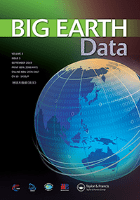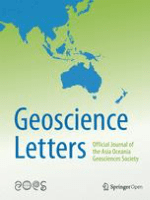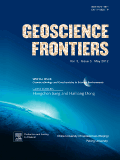
Journal of Earth System Science
Scope & Guideline
Connecting Disciplines for Global Environmental Solutions
Introduction
Aims and Scopes
- Interdisciplinary Earth System Science:
The journal emphasizes research that integrates multiple disciplines such as geology, meteorology, oceanography, and environmental sciences to provide comprehensive insights into Earth system processes. - Climate Change and Environmental Impact Studies:
There is a strong focus on understanding climate change impacts, assessing environmental changes, and evaluating their implications for ecosystems and human societies. - Geophysical and Geochemical Analysis:
The journal publishes studies involving geophysical and geochemical methods to analyze subsurface structures, mineral deposits, and natural resources, which are crucial for understanding geological processes. - Natural Hazards and Risk Assessment:
Research addressing natural hazards, including earthquakes, landslides, and floods, along with their risk assessment and management strategies, is a key area of interest. - Remote Sensing and GIS Applications:
The use of remote sensing and geographic information systems (GIS) in monitoring and analyzing environmental phenomena, land use changes, and resource management is prominently featured. - Hydrology and Water Resources Management:
The journal includes studies on hydrological processes, water quality, and sustainable management practices to address water-related challenges. - Sustainable Development and Resource Management:
Research that focuses on sustainable practices in natural resource management, including energy, minerals, and water, is a critical aspect of the journal's scope.
Trending and Emerging
- Machine Learning and Big Data Applications:
There is a growing trend towards utilizing machine learning and big data analytics in various Earth science applications, including climate modeling, geological mapping, and resource management. - Climate Change Adaptation and Mitigation Strategies:
Research focusing on strategies for climate change adaptation and mitigation, including sustainable development practices, is increasingly prominent, reflecting global priorities. - Integrated Water Resource Management (IWRM):
The emphasis on integrated approaches to manage water resources sustainably, considering the interconnections between hydrology, ecology, and human activities, is gaining traction. - Urbanization and Its Environmental Impacts:
Studies investigating the impacts of urbanization on local climates, hydrology, and ecosystems are emerging as critical areas of research, especially in rapidly developing regions. - Geospatial Technologies in Environmental Monitoring:
The application of geospatial technologies, including remote sensing and GIS, for monitoring environmental changes and managing natural resources is increasingly featured in recent publications. - Resilience and Vulnerability Assessments:
Research focusing on assessing the resilience and vulnerability of communities and ecosystems to natural hazards and climate change is becoming more prominent, highlighting the need for adaptive strategies.
Declining or Waning
- Traditional Geological Surveys:
Papers focused solely on traditional geological surveys, without integrating modern methodologies like remote sensing or machine learning, have become less common as the field evolves towards more innovative approaches. - Historical Geological Studies:
Research primarily centered on historical geology, such as stratigraphic descriptions without contemporary relevance or application, appears to be waning as the focus shifts to current environmental issues and applications. - Basic Mineralogy without Environmental Context:
Studies that explore mineralogy in isolation, without linking findings to environmental issues or applications relevant to society, are less frequently published, indicating a shift towards applied research. - Purely Theoretical Geophysics:
Theoretical studies in geophysics, lacking practical applications or empirical validation, are becoming less favored in light of the growing demand for applied research that addresses real-world problems.
Similar Journals

Cuadernos de Investigacion Geografica
Innovating Research for a Changing PlanetCuadernos de Investigacion Geografica, published by UNIV RIOJA, SERV PUBLICACIONES, stands as a premier open-access journal dedicated to advancing knowledge in the fields of geography, environmental science, and earth sciences. Since its inception in 1983, this journal has fostered innovative research and critical discourse, currently holding a distinguished position in Scopus with impressive quartile rankings, including Q2 in both Earth and Planetary Sciences, and Geography, Planning and Development, reflecting its impact and relevance. With an aim to present high-quality, peer-reviewed articles that contribute to the understanding of our planet and its systems, Cuadernos de Investigacion Geografica welcomes submissions from researchers, professionals, and students alike, fostering a collaborative environment that spans across diverse geographical contexts. Operating from its hub in Logroño, Spain, this journal continues to be a vital resource for anyone engaged in geographical research and environmental analysis, providing open access to enhance knowledge sharing and innovation in these dynamic fields.

Earth and Space Science
Championing Open Access for Earth and Space Innovations.Earth and Space Science, published by the American Geophysical Union, is a distinguished open-access journal that has profoundly impacted the realms of earth and planetary sciences as well as environmental science since its inception in 2014. With impressive rankings, including Q1 in both Earth and Planetary Sciences and Environmental Science for 2023, this journal ranks 38th out of 195 in the general Earth and planetary sciences category and 51st out of 219 in environmental science, showcasing its commitment to high-quality research dissemination. The journal serves as a vital platform for researchers, professionals, and students, fostering the exploration of critical topics and advancements within these pivotal fields. With an accessible format, researchers can benefit from the rich content available, furthering their knowledge and ensuring that groundbreaking discoveries reach a broader audience. The journal's ongoing commitment to open access aligns with contemporary trends in scholarly communication, emphasizing inclusion and collaboration in tackling pressing global challenges.

Frontiers of Earth Science
Elevating Earth Science Research to New HeightsFrontiers of Earth Science is a prominent academic journal in the field of Earth and Planetary Sciences, published by Springer. With an ISSN of 2095-0195 and an E-ISSN of 2095-0209, this journal serves as a significant platform for researchers and professionals to disseminate their findings from 2007 to 2024. It is recognized for its impactful contributions within the category of Earth and Planetary Sciences, boasting a respected Q2 ranking in 2023. With a Scopus ranking of 64 out of 195, placing it in the 67th percentile, Frontiers of Earth Science continues to drive academic dialogue and innovation. The journal is dedicated to exploring a diverse range of topics, including geology, meteorology, and environmental science, and amplifying the understanding of Earth systems through rigorous research. Located in New York, USA, this journal embraces an Open Access model, ensuring that groundbreaking research is readily available to the global scientific community, thereby enhancing its accessibility and impact.

Environmental Earth Sciences
Advancing knowledge for a sustainable Earth.Environmental Earth Sciences is a prestigious journal published by Springer, dedicated to advancing knowledge in the multifaceted fields of Earth Sciences, including Earth-Surface Processes, Environmental Chemistry, Geology, and Soil Science. With an ISSN of 1866-6280 and an E-ISSN of 1866-6299, this journal occupies a notable position in the academic landscape, consistently ranked in the Q2 category across multiple disciplines in 2023. It supports open access to foster wider dissemination of impactful research, enhancing visibility and accessibility for authors and readers alike. The journal's ongoing commitment to publishing innovative studies and reviews makes it an essential resource for researchers, professionals, and students alike. With a strong focus on addressing contemporary environmental challenges, Environmental Earth Sciences invites contributions that are both original and interdisciplinary, making a significant impact in understanding Earth dynamics and sustainability.

Big Earth Data
Innovating Insights Through Big Data in Earth SciencesBig Earth Data is a prestigious open-access journal that has been at the forefront of advancing research in the intersection of earth science and computer technology since its inception in 2017. Published by TAYLOR & FRANCIS LTD in the United Kingdom, this journal is dedicated to disseminating groundbreaking findings and innovative methodologies in the fields of Earth and Planetary Sciences and Computer Science Applications. With a commendable impact factor and an impressive positioning in the Scopus rankings—claiming Q1 status in Computers in Earth Sciences and Q2 in Computer Science Applications—it serves as a vital resource for researchers, professionals, and students alike. The journal encourages submissions that explore the integration of big data technologies in managing, analyzing, and visualizing earth-related data, thereby fostering interdisciplinary collaboration. Since embracing its open-access model, Big Earth Data has enhanced the accessibility of high-quality research, promoting a broader dialogue in the scientific community and contributing to informed decision-making in global environmental challenges.

NATURAL HAZARDS AND EARTH SYSTEM SCIENCES
Unraveling the Complexities of Natural HazardsNATURAL HAZARDS AND EARTH SYSTEM SCIENCES, an esteemed journal published by COPERNICUS GESELLSCHAFT MBH, focuses on the interdisciplinary study of natural hazards and their impact on Earth system processes. Since its inception in 2001, this Open Access journal has been instrumental in disseminating high-quality research, facilitating a global exchange of knowledge in the field of Earth and Planetary Sciences. With an impressive Q1 ranking in its category and a commendable Scopus Rank of 22 out of 195, it serves as a crucial platform for researchers striving to understand and mitigate the risks associated with natural hazards. The journal is committed to enhancing environmental resiliency and promoting sustainable practices, making it essential reading for scholars, practitioners, and policymakers dedicated to tackling the challenges posed by our dynamic planet. Based in Germany, at BAHNHOFSALLEE 1E, GOTTINGEN 37081, it continues to support the growing body of knowledge that bridges scientific research with practical application.

Geoscience Letters
Pioneering Open Access in Earth SciencesGeoscience Letters, published by Springer, is a prominent open-access journal in the field of Earth and Planetary Sciences, recognized for its dedication to advancing knowledge and research in this vital area of study. With a reported impact factor that reflects its esteemed position—ranking in the Q1 quartile of Earth and Planetary Sciences, particularly as the journal ranks #48 out of 195 in the general category according to Scopus—the journal serves as a vital resource for researchers, professionals, and students. Since its inception in 2014, Geoscience Letters has facilitated the dissemination of high-quality research and critical insights, aiming to bridge the gap between scientific discovery and societal needs. Its commitment to open access ensures that the latest findings are readily available to a global audience, thus enhancing collaboration and innovation within the geosciences community.

Geosciences
Advancing Knowledge in Earth and Planetary Sciences.Geosciences is a prestigious open-access journal published by MDPI, dedicated to advancing research in the field of Earth and Planetary Sciences. Since its inception in 2011, this journal has fostered a collaborative environment for the dissemination of innovative ideas and findings, contributing significantly to the academic community's understanding of complex geological processes. The journal has achieved a commendable 2023 ranking in the second quartile (Q2) within its category, highlighting its impact and relevance in the field, with a Scopus rank of #41 out of 195 journals, placing it in the 79th percentile. With an aim to span a broad range of topics from environmental geology to planetary exploration, Geosciences is pivotal for researchers, professionals, and students looking for an accessible platform to share their work and stay informed of the latest developments. As a fully open-access journal, it ensures that high-quality research is freely available, fostering greater dissemination of knowledge across the globe.

Science China-Earth Sciences
Bridging Global Research and Local Insights in Earth Sciences.Science China-Earth Sciences, published by SCIENCE PRESS, stands as a leading journal in the field of Earth and Planetary Sciences, currently holding a prestigious Q1 ranking in the 2023 category and positioned at Rank #12 out of 195 in Scopus, reflecting its significance with an impressive 94th percentile. Specializing in a wide array of topics including geological processes, environmental science, and planetary studies, the journal serves as a vital resource for researchers, professionals, and students alike, fostering interdisciplinary collaboration and advanced scientific discourse. With a commitment to accessibility and knowledge dissemination, Science China-Earth Sciences offers an Open Access model, ensuring that high-quality research is available to a global audience. Situated in Beijing, China, this journal is dedicated to promoting innovative scientific advancements and understanding the complexities of our planet from 2010 to 2024 and beyond. As such, it remains essential for anyone engaged in the dynamic and evolving field of Earth sciences.

Geoscience Frontiers
Leading the Charge in Earth Science DiscoveriesGeoscience Frontiers is a premier open-access journal that has been at the forefront of disseminating impactful research in the field of Earth and Planetary Sciences since its inception in 2010. Published by China University of Geosciences, Beijing, this journal operates from the Netherlands and has gained recognition for its rigorous peer-review process and high standards of scholarship, earning a distinguished position as Q1 in the Earth and Planetary Sciences category. With a Scopus ranking of 5 out of 195, placing it in the 97th percentile, it reflects the journal's commitment to addressing global geological challenges and advancing our understanding of the Earth’s dynamic systems. As an open-access platform, Geoscience Frontiers ensures that vital research is widely accessible, fostering collaboration and innovation among researchers, professionals, and students alike. By providing a forum for cutting-edge discoveries and theories, the journal plays a critical role in shaping the future of geoscientific research and education.